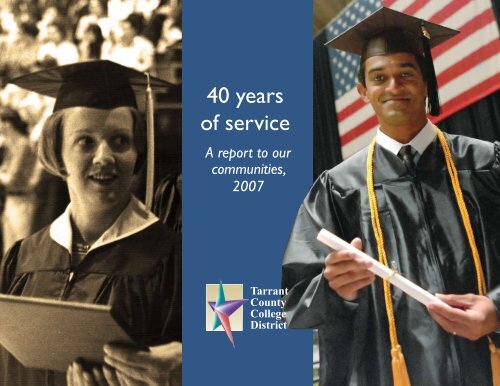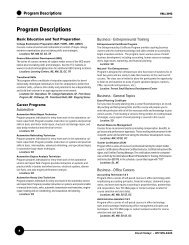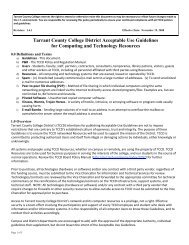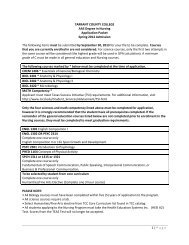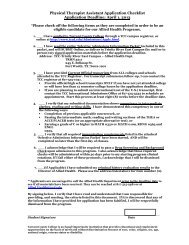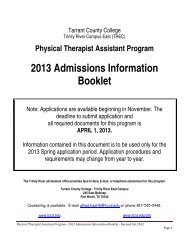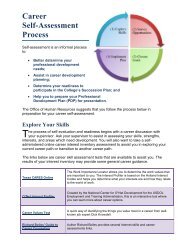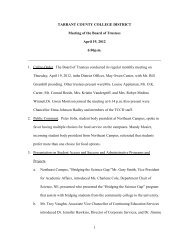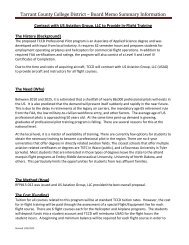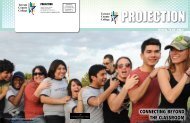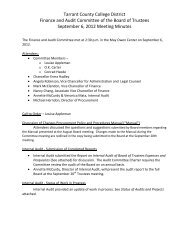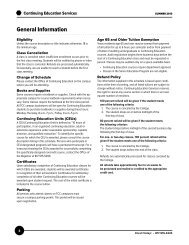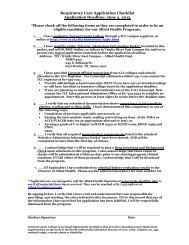40 years of service - Tarrant County College
40 years of service - Tarrant County College
40 years of service - Tarrant County College
You also want an ePaper? Increase the reach of your titles
YUMPU automatically turns print PDFs into web optimized ePapers that Google loves.
<strong>40</strong> <strong>years</strong><br />
<strong>of</strong> <strong>service</strong><br />
A report to our<br />
communities,<br />
2007<br />
<strong>Tarrant</strong><br />
<strong>County</strong><br />
<strong>College</strong><br />
District<br />
Tomorrow Starts Here<br />
Tomorrow Starts Here
Chancellor’s Introduction<br />
The mission <strong>of</strong> the <strong>Tarrant</strong> <strong>County</strong><br />
<strong>College</strong> District, as with all community<br />
colleges, is multifaceted. Indeed,<br />
we are sometimes accused <strong>of</strong> trying to<br />
be all things to all people. But, while many<br />
types <strong>of</strong> students come to us seeking a wide<br />
variety <strong>of</strong> outcomes, our mission can be<br />
summed up in a single word – <strong>service</strong>.<br />
Service – to our students and our community<br />
– has been a byword at TCC ever<br />
since its founding <strong>40</strong> <strong>years</strong> ago. It is reflected<br />
in who we are, what we do, and even in<br />
what we are called. Perhaps the administrative<br />
reorganization I’ve recently implemented<br />
best <strong>of</strong>fers an example <strong>of</strong> the importance<br />
we attach to how we present ourselves and<br />
our roles <strong>of</strong> servant leaders to the public and<br />
our students. Look through the listing <strong>of</strong> the<br />
Chancellor’s Executive Leadership Team<br />
members elsewhere in this booklet and you<br />
will see “<strong>service</strong>” prominent among their<br />
new titles.<br />
The emphasis on <strong>service</strong> is no accident.<br />
It was present from the very beginning,<br />
when a handful <strong>of</strong> public-minded citizens<br />
saw the need for a community college in<br />
<strong>Tarrant</strong> <strong>County</strong> and spearheaded the drive to<br />
make it a reality. And that spirit <strong>of</strong> <strong>service</strong>,<br />
so prevalent among the <strong>College</strong> District’s<br />
founders, has continued and even been<br />
enhanced by their successors – the members<br />
<strong>of</strong> our Board <strong>of</strong> Trustees. These seven<br />
women and men give willingly <strong>of</strong> their time,<br />
expertise, and wisdom with no thoughts <strong>of</strong><br />
personal gain or glory. Their only reward is<br />
the knowledge <strong>of</strong> <strong>service</strong> rendered and a job<br />
well done.<br />
But, it is one thing to talk about <strong>service</strong><br />
and something else to provide it. So, exactly<br />
what are we talking about? In my opinion,<br />
<strong>service</strong> at TCC means shaping educational<br />
programs to fit our students’ goals and providing<br />
a strong teaching and support system<br />
to help ensure those goals are met. The use<br />
<strong>of</strong> metaphor may help bring home the point:<br />
Instead <strong>of</strong> making round holes and waiting<br />
for the round pegs to appear, TCC takes the<br />
pegs as they come and cuts the holes to fit.<br />
Providing such a wide variety <strong>of</strong> <strong>service</strong>s<br />
– academic and technical programs,<br />
workforce education for business and industry,<br />
continuing education courses for all<br />
ages, support functions such as counseling,<br />
learning resources, and financial aid – is a<br />
challenge. And that challenge is made all<br />
the greater by a decrease in the level <strong>of</strong> state<br />
appropriations. Our local taxpayers, recognizing<br />
the value they receive, have stepped<br />
into the breach. Likewise, our students have<br />
paid more, even though tuition increases<br />
have been kept as modest as possible. The<br />
key to our ability to maintain and increase<br />
our level <strong>of</strong> <strong>service</strong>s, however, is for our<br />
state leaders to realize that higher education<br />
is the very best investment they can make in<br />
Texas’ future.<br />
Throughout these pages you will find<br />
examples <strong>of</strong> the outstanding <strong>service</strong>s provided<br />
by the faculty and staff at TCC. These<br />
men and women continue the tradition that<br />
was begun when what was then <strong>Tarrant</strong><br />
<strong>County</strong> Junior <strong>College</strong> first opened its doors<br />
in 1967. Through those doors have passed<br />
hundreds <strong>of</strong> thousands <strong>of</strong> students – young<br />
and older, confident and fearful – but all<br />
looking to us to make their lives more enriched.<br />
I trust that we served them well, and<br />
I pledge that we will do so for those yet to<br />
come.<br />
¡Gracias!<br />
Leonardo de la Garza, Chancellor
Faculty<br />
A steady diet <strong>of</strong> success<br />
Knowing what people should be eating<br />
is one thing. Getting them to<br />
eat it can be quite another.<br />
That’s why Samantha “Sam” Powell calls<br />
dietetics a “people pr<strong>of</strong>ession.”<br />
“You’ve got to be good with people to<br />
work in this field,” she said. “You can have<br />
good computer skills and other skills, but<br />
you’re going to be working one-on-one and<br />
you have to be really good to get people to<br />
change their behaviors.”<br />
To that end, Powell gets her Southeast<br />
Campus Dietetics Technology students out<br />
<strong>of</strong> the classroom and into places where<br />
people – and their food – are. They gain<br />
practical experience in hospitals, nursing<br />
homes, schools, Meals on Wheels, food<br />
banks, health clubs, and even – as part <strong>of</strong> a<br />
fund-raising endeavor – a concession stand<br />
at Dallas Cowboys games.<br />
It was the fund-raising that indirectly led<br />
to one <strong>of</strong> the program’s greatest honors. The<br />
students raise money so that they can attend<br />
the annual conference <strong>of</strong> the Texas Dietetic<br />
Association. At the 2003 conference, the<br />
TCC students’ volunteer efforts drew the<br />
Samantha Powell
attention <strong>of</strong> the state association president,<br />
who was so impressed that he nominated<br />
Powell for the TDA’s Outstanding Educator<br />
Award. Powell won the state award in 2005<br />
and subsequently was named the outstanding<br />
educator for a seven-state region <strong>of</strong> the<br />
American Dietetic Association.<br />
Powell isn’t the program’s only award<br />
winner. TCC’s Vicki Catlin was named<br />
the state’s outstanding student in 2005, and<br />
Jamie Piel captured the honor last year.<br />
“It’s just that I want our students to have<br />
the best,” Powell said. “I want to provide<br />
them that experience, to open their eyes to<br />
everything that’s out there so that they can<br />
decide what they like and what they don’t<br />
like.”<br />
Wherever the students go – into the<br />
workplace or on to a university (her graduates<br />
have a 100 percent acceptance rate)<br />
– they will carry with them Powell’s emphasis<br />
on working with people. “No matter<br />
what we put in your head,” she said, “if<br />
you can’t get it out at a reasonable level for<br />
the general public, then you haven’t helped<br />
anyone.”<br />
Elsewhere<br />
• Jane Harper, dean <strong>of</strong> Northeast Campus’<br />
Humanities Division, was named<br />
Texas Foreign Language Association<br />
Administrator <strong>of</strong> the Year. Harper has<br />
co-authored several books and published<br />
more than 50 articles in pr<strong>of</strong>essional<br />
journals.<br />
• Peter Feresten, associate pr<strong>of</strong>essor<br />
<strong>of</strong> photography, was named a Distinguished<br />
Texas Artist by the Artist<br />
Exhibition Advisory Panel <strong>of</strong> the Fort<br />
Worth Community Arts Center and the<br />
Arts Council <strong>of</strong> Fort Worth and <strong>Tarrant</strong><br />
<strong>County</strong>. Feresten is best known for his<br />
documentation <strong>of</strong> life in Fort Worth’s<br />
African-American community.<br />
• Two TCC faculty members, Pr<strong>of</strong>essor<br />
<strong>of</strong> Government and History<br />
Laura Wood and Psychology<br />
Instructor Staussa Ervin, were<br />
invited to participate as fellows in<br />
the Freeman Foundation Symposium<br />
conducted by the Salzburg<br />
Seminar in Salzburg, Austria.<br />
The topic was “East Asia – The<br />
United States: A Search for Common<br />
Values.”<br />
What they say ...<br />
“I’ve always had a<br />
weight problem, and<br />
it’s something that I<br />
see in a lot <strong>of</strong> people,<br />
especially in little<br />
kids. I would love to<br />
work with kids because that’s where the<br />
problem starts, and if you can get them<br />
as young kids, then you can change<br />
their whole lives.”<br />
– Mariela Moreno,<br />
Dietetic Technology Student
Innovation<br />
Getting a sure start<br />
Veteran Southeast Campus Counselor<br />
Penny Matthes was well aware<br />
that many new-to-college students<br />
need help – particularly if they’re the first<br />
from their families to go beyond high school<br />
and are academically at-risk. She also knew<br />
that TCC has many <strong>service</strong>s to help such<br />
students.<br />
The challenge? How to forge a stronger<br />
link between help needed and help available.<br />
She got the go-ahead to design a special program,<br />
one that, in her words, “gave beginning<br />
students a boost, a lift, some help – a<br />
sure start.”<br />
Thus was born SureStart, a program <strong>of</strong><br />
such elegant simplicity and proven effectiveness<br />
that it was honored with a 2006 Star<br />
Award for innovation by the Texas Higher<br />
Education Coordinating Board, one <strong>of</strong> only<br />
eight given statewide. The program has also<br />
won an innovation award from the National<br />
Council <strong>of</strong> Instructional Administrators.<br />
Students recruited into the program must<br />
be new to college and have failed at least<br />
two <strong>of</strong> the three-part (reading, writing, math)<br />
Pr<strong>of</strong>essor Hector Menchaca, Vanessa Pacheco, Sven Nickerson
What they say ...<br />
portions <strong>of</strong> assessment tests. They take at<br />
least three carefully selected courses together<br />
as a group. “The idea is that they form a<br />
learning community,” said Matthes. “And<br />
they really do bond – supporting one another<br />
as well as receiving support from faculty<br />
and staff.”<br />
And there’s more support. SureStart<br />
faculty members are carefully chosen.<br />
Resources such as the library, counseling,<br />
writing and math labs – available to all students<br />
– receive special emphasis, with staff<br />
members making presentations in SureStart<br />
classes.<br />
The best thing about SureStart is that<br />
it works. Over the first three <strong>years</strong> <strong>of</strong> the<br />
program, SureStart students had significantly<br />
higher grade point averages, course<br />
completion rates, and re-enrollment rates<br />
than students with similar backgrounds.<br />
And there’s another big plus, Matthes<br />
said. “It doesn’t cost the state, the taxpayers,<br />
or the District a single additional penny.”<br />
Elsewhere<br />
• Peter Hacker, associate pr<strong>of</strong>essor <strong>of</strong><br />
history, was presented an Innovative<br />
Teaching Award by the Amon Carter<br />
Museum <strong>of</strong> Fort Worth. Hacker had<br />
designed a class assignment centered<br />
on the museum’s collection <strong>of</strong> works<br />
showing early Texas history.<br />
• TCC Northeast Campus students won<br />
gold, silver, and bronze medals at the<br />
2006 national competition <strong>of</strong> Phi Rho<br />
Pi, the honor society for community<br />
college speech competitions.<br />
• TCC’s student<br />
newspaper, The Collegian,<br />
captured four<br />
individual first-place<br />
awards and second<br />
places in both the<br />
General Excellence<br />
and Sweepstakes<br />
categories in the<br />
fall 2006 Texas<br />
Community <strong>College</strong><br />
Journalism Association<br />
Contest.<br />
Capital Outlay Expenditu r e s<br />
( Does not include expenditures<br />
toward new campus )<br />
Thousands<br />
$35000<br />
26250<br />
15250<br />
8750<br />
0<br />
Y ea r<br />
00-01<br />
01-02<br />
“I was scared. It had<br />
been 20 <strong>years</strong> since I<br />
graduated from high<br />
school. SureStart<br />
helped me know how<br />
to come to college,<br />
what to expect, how to<br />
participate. It helped us as a group to<br />
work together, giving one another that<br />
power to keep going on.”<br />
– Shirley Emissah,<br />
SureStart Graduate<br />
02-03<br />
Capital<br />
Outlay<br />
Gene r a l<br />
Equipment<br />
Computer<br />
Equipment<br />
T ota l<br />
03-04 04-05 05-06 06-07
First Responders<br />
Your life in their hands<br />
If you’re unfortunate enough to become<br />
an accident victim, the chances are<br />
excellent that many <strong>of</strong> the people who’ll<br />
come to your aid – firefighters, police <strong>of</strong>ficers,<br />
emergency room technicians, nurses<br />
– will be <strong>Tarrant</strong> <strong>County</strong> <strong>College</strong> graduates.<br />
TCC has long been the county’s prime<br />
source for public safety and health occupations<br />
pr<strong>of</strong>essionals.<br />
If the injury is life-threatening, however,<br />
the person you’d most want to appear is a<br />
TCC-trained paramedic. “In the first five<br />
minutes <strong>of</strong> an emergency, paramedics can do<br />
pretty much anything a physician can do,”<br />
said Emergency Medical Technology Program<br />
Coordinator Jeff McDonald. “They’re<br />
capable <strong>of</strong> pushing a wide variety <strong>of</strong> drugs,<br />
capable <strong>of</strong> doing cardiac care and doing a<br />
couple <strong>of</strong> small emergency surgical procedures.”<br />
The training is rigorous – a five-semester,<br />
16-month program on top <strong>of</strong> EMT<br />
school. “It’s pretty intense,” McDonald said,<br />
“a lot <strong>of</strong> time spent in the hospitals and the<br />
other clinical sites.” Graduates are eligible
to take the national registry examination for<br />
paramedics, and TCC has one <strong>of</strong> the highest<br />
pass rates in the nation.<br />
The program graduates about 130 EMTs<br />
and 50 paramedics each year, and jobs are<br />
plentiful, especially for the paramedics.<br />
“Most <strong>of</strong> our paramedic students, if they try<br />
even a little bit, will have jobs waiting for<br />
them,” McDonald said.<br />
Little wonder, then, that the program<br />
is popular – as many as five paramedic<br />
class sequences, three EMT sequences, and<br />
continuing education for more than 20 fire<br />
departments all occurring simultaneously.<br />
It long ago outgrew its Northeast Campus<br />
quarters and is being taught throughout the<br />
county by four full-time faculty, 45 adjunct<br />
faculty, and about 200 preceptors – pr<strong>of</strong>essionals<br />
who monitor students’ clinical work.<br />
Those students – an increasing number<br />
<strong>of</strong> whom are women – vary from the 18-<br />
year-old “who always wanted to be a firemen<br />
and who doesn’t have a clue” to the<br />
<strong>40</strong>-year-old “who pretty much knows what<br />
he wants to do with his life.”<br />
Those who are drawn to the pr<strong>of</strong>ession<br />
by the glitz and glamour <strong>of</strong> television rescue<br />
shows soon get a reality check, said McDonald.<br />
“They come to realize that a lot <strong>of</strong> the<br />
time sick people can be boring. Also, you<br />
can’t smell something or someone on TV.”<br />
Elsewhere<br />
• John Hiser, associate pr<strong>of</strong>essor <strong>of</strong><br />
health sciences, served as president <strong>of</strong><br />
the American Association for Respiratory<br />
Care.<br />
• Jeniesa Johnson, associate<br />
pr<strong>of</strong>essor <strong>of</strong> radiologic<br />
technology, served as chair<br />
<strong>of</strong> the Texas Society <strong>of</strong><br />
Radiologic Technologists<br />
Board <strong>of</strong> Directors.<br />
• Bryan Stewart, dean <strong>of</strong> the<br />
TCC Southeast Campus<br />
Mathematics and Science<br />
Division, is serving as a<br />
member <strong>of</strong> the State Board<br />
<strong>of</strong> Education’s review panel<br />
for high school math and<br />
calculus textbooks.<br />
What they say ...<br />
“I just found out that I<br />
passed my final exam<br />
and my clinical skills, so<br />
I’m now eligible to test<br />
for national registry<br />
certification. I’ve been<br />
working toward this for<br />
the last 16 months. I’m thrilled, and I<br />
think my wife is even more excited than<br />
I am.”<br />
– Jason Quick,<br />
Paramedic Graduate
Continuing Education<br />
Special needs, special students<br />
When Vice President for Continuing<br />
Education Services Carrie<br />
Tunson, answering the challenge<br />
<strong>of</strong> a parents’ group, proposed to start<br />
a non-credit program on Southeast Campus<br />
for special-needs students, some TCC<br />
administrators asked her why. Her response:<br />
Why not? “We have <strong>College</strong> for Kids, we<br />
have Senior Ed, we have English as a Second<br />
Language,” she said. “Why shouldn’t<br />
these students be here? We’re serving a<br />
need. We’re a community college, and<br />
they’re part <strong>of</strong> our community.”<br />
Ten <strong>years</strong> later, any resistance to the<br />
program – first called Transitions and later<br />
renamed First Choice – has long since melted,<br />
thawed by the warmth <strong>of</strong> the students<br />
themselves. “Members <strong>of</strong> the faculty and<br />
staff come in to speak to our young people,”<br />
Tunson said. “Many regular TCC students<br />
volunteer to help. It’s amazing how they’ve<br />
touched everyone.”<br />
First Choice, the tuition for which is paid<br />
either by families or through social <strong>service</strong><br />
agencies, enrolls mentally challenged stu-<br />
Instructor Rex Allen (left), Scott Patrick
What they say ...<br />
dents who are beyond public school age.<br />
They range in age from 18 to 45 and must<br />
be able to care for themselves or be accompanied<br />
by a caregiver. Their parents’ hopes<br />
are modest, said Tunson. “They know their<br />
children will outlive them and they want to<br />
make them as independent as possible so<br />
that they can live in a group home setting<br />
and maybe have a part-time job.”<br />
To that end, the First Choice students are<br />
taught not only socialization skills, but also<br />
job skills, arithmetic, basic computer use,<br />
cooking, reading, and Spanish. A class on<br />
pet care is being planned.<br />
But, even as these special TCC students<br />
learn, they teach others. “They have taught<br />
me to enjoy every day as if it were going to<br />
be my last,” Tunson said. “I’ve learned so<br />
much from them.”<br />
Elsewhere<br />
• All four TCC campuses and the May<br />
Owen District Center were honored<br />
with Top Contributor Awards in<br />
2005-06 from the State Employee<br />
Charitable Campaign. The Districtwide<br />
goal for employee giving was<br />
$102,769, and the amount actually<br />
raised was $179,007.<br />
• <strong>College</strong> for Kids, TCC’s highly<br />
popular summer program for children<br />
and youths, celebrated its 25th anniversary<br />
in 2006. An estimated 45,850<br />
youngsters have taken classes in<br />
everything from hip hop<br />
to the stock market.<br />
• The Country Strings, a<br />
musical group made up<br />
<strong>of</strong> students and members<br />
<strong>of</strong> the faculty and staff at<br />
Northeast Campus, made<br />
and sold copies <strong>of</strong> a CD<br />
in 2006 with all proceeds<br />
going to benefit a New<br />
Orleans nursing home<br />
damaged by Hurricane<br />
Katrina.<br />
TCC Graduates Continue to Increase<br />
3000<br />
2000<br />
1000<br />
0<br />
2,310<br />
1999<br />
2,448<br />
2000<br />
“I enjoy every class<br />
– like cooking,<br />
computers, sign<br />
language, Spanish.<br />
It’s fun. I also like to<br />
help my mom. She’s<br />
a teacher in first grade, and I help her<br />
with the kids in her class.<br />
– Allison Brooks,<br />
First Choice Student<br />
2,447 2,498<br />
2,830 2,817<br />
2001 2002 2003 2004<br />
2,829<br />
2005<br />
Graduates include those awarded Associate <strong>of</strong> Arts and Associate<br />
<strong>of</strong> Applied Science degrees and credit and non-credit Certificates<br />
<strong>of</strong> Completion.<br />
2,959<br />
2006
Technology<br />
So far, and yet so near<br />
Instructor Kathy Sellman<br />
As a TCC administrator, Erma Johnson<br />
Hadley knew that the<br />
<strong>College</strong>’s nursing program wanted<br />
to grow. As chair <strong>of</strong> the <strong>Tarrant</strong> <strong>County</strong><br />
Hospital District’s Board <strong>of</strong> Managers, she<br />
knew that John Peter Smith Hospital needed<br />
nurses. “So I thought, ‘Surely there’s something<br />
we can do with the two <strong>of</strong> us working<br />
in partnership,’” she said.<br />
“Something” turned out to be a plan<br />
whereby JPS employees are recruited into<br />
the nursing program and attend classes via<br />
an audiovisual linkup with South Campus<br />
while doing the clinical part <strong>of</strong> their studies<br />
at the hospital. “It’s a great solution all<br />
around,” said Johnson Hadley. “We have<br />
a whole hospital here, so we didn’t have to<br />
build any additional campus facilities.”<br />
The JPS program is only one example <strong>of</strong><br />
how TCC is increasingly employing technology<br />
as a means to expand its <strong>service</strong>s.<br />
Interactive audiovisual classes, televised<br />
classes, and computer-delivered instruction<br />
make it possible to have increased enrollment<br />
without bricks-and-mortar expenses.
In 2005-06 there were 23,815 enrollments in<br />
distance learning courses.<br />
The students at JPS come from throughout<br />
the hospital – nurse aides, secretaries,<br />
technicians, housekeeping staff. They attend<br />
class in a facility specially equipped with<br />
video capability and laptop computers. The<br />
program will graduate its first four students<br />
in May 2007. Nine more are enrolled, with<br />
another 10 due to start in the fall. All have<br />
signed agreements whereby they will work<br />
for JPS for at least two <strong>years</strong> after graduating.<br />
The program is certainly a winner as far<br />
as JPS is concerned. “I’m especially excited<br />
that these nurses, having trained at JPS, will<br />
be very comfortable in their work environment<br />
from the outset,” said Adonna Lowe,<br />
JPS vice president and chief nursing <strong>of</strong>ficer.<br />
“I’ll have 23 nurses I otherwise would not<br />
have had.”<br />
Johnson Hadley added, “The program<br />
works all around. It gives <strong>Tarrant</strong> <strong>County</strong><br />
<strong>College</strong> new students, it gives JPS new<br />
nurses, and it gives other people new lives.”<br />
Elsewhere<br />
• Kevin Eason served as a vice president<br />
<strong>of</strong> the United States Distance Learning<br />
Association. He is a past president <strong>of</strong><br />
the Texas Distance Learning Association.<br />
• Employees at Harris Methodist Fort<br />
Worth Hospital are earning their General<br />
Educational Development (GED)<br />
diplomas and completing English as<br />
a Second Language courses at a skills<br />
center established at the hospital by<br />
TCC’s Corporate Services Division.<br />
The first students graduated in April<br />
2005.<br />
• For the fourth time in five<br />
<strong>years</strong>, TCC received the Texas<br />
Distance Learning Association’s<br />
Outstanding Institutional<br />
Commitment to Service<br />
Award. TCC is the only college<br />
or university to win the<br />
award more than once.<br />
What they say ...<br />
“The distance<br />
learning program is<br />
a great way to go to<br />
RN school and be<br />
able to work as well.<br />
Another advantage<br />
is that the classes<br />
are smaller, which<br />
allows for more group discussions and<br />
personal attention.”<br />
– Melissa Flick,<br />
JPS Nursing Student
Corporate Services<br />
Calling for assistance<br />
When LG Electronics was preparing<br />
to open its state-<strong>of</strong>-the art<br />
cellular telephone repair center<br />
near Fort Worth Alliance Airport, it needed<br />
not only trained employees, but also a place<br />
to train them. TCC’s Corporate Services<br />
Division provided both.<br />
Aided by a $300,000 grant from the<br />
Texas Workforce Commission, LG arranged<br />
a short-term lease for space in TCC’s Fort<br />
Worth Opportunity Center. There, they set<br />
up space to interview prospective employees,<br />
facilities to train them, and even a production<br />
line so that work could begin before<br />
the permanent facility was open.<br />
“It was a miracle,” said Dan Kilgore,<br />
LG’s human resources manager. “We finalized<br />
our space needs with (TCC account<br />
manager) Kay Lee on a Thursday afternoon,<br />
and on the following Monday morning we<br />
were operational and ready to go.”<br />
The arrangement was only a part <strong>of</strong> the<br />
<strong>service</strong>s provided to LG by TCC. In addition<br />
to such courses as Management Es-<br />
Richard Hoe, Bimal Shretha
sentials, Forklift Safety, Micros<strong>of</strong>t Excel,<br />
and OSHA Regulations, there was an urgent<br />
need for language skills. Many <strong>of</strong> the<br />
Korean-based firm’s managerial employees<br />
spoke little or no English and thus enrolled<br />
in English as a Second Language classes.<br />
Just as important for communications,<br />
classes were taught in Korean language and<br />
culture for local employees.<br />
The LG-TCC partnership thus has been<br />
beneficial to both new and existing <strong>Tarrant</strong><br />
<strong>County</strong> residents. Korean Ben Choi used<br />
the management training to win a promotion.<br />
Bimal Shretha, who had been working<br />
at a local gas station, took advantage <strong>of</strong> the<br />
training to gain a job as a skilled production<br />
worker.<br />
“I believe that the TCC classes have<br />
benefited our company, especially in cases<br />
such as Ben Choi, who is responsible for<br />
incoming shipments and inspections,” said<br />
Min Gyo (Richard) Hoe, head <strong>of</strong> LG’s Fort<br />
Worth operation. “Our technical and soldering<br />
skills have been developed and we<br />
recently started Korean culture and Korean<br />
language classes. We took Excel development<br />
classes. All the TCC classes have<br />
helped our company.”<br />
Elsewhere<br />
• TCC and four partner institutions received<br />
a $499,950 grant to establish a<br />
National Center for Aircraft Technician<br />
Training. The project, headquartered<br />
at Northwest Campus and under the<br />
direction <strong>of</strong> Dean Floyd Curtis, will<br />
establish and monitor the first industrywide<br />
training standards for aircraft<br />
electronics technicians.<br />
• Responding to increased demand for<br />
skilled employees, TCC has established<br />
an Associate <strong>of</strong> Applied Science<br />
Degree in Convergence Technology<br />
– the melding <strong>of</strong> voice, video, and data<br />
into a single flexible network using<br />
current and emerging technologies.<br />
• TCC’s Division <strong>of</strong><br />
Workforce Services<br />
received a $300,000<br />
grant award from<br />
Workforce Solutions,<br />
<strong>Tarrant</strong> <strong>County</strong>’s local<br />
workforce board,<br />
to provide education<br />
and training <strong>service</strong>s<br />
through the new Basic<br />
Education and Skills<br />
Training (BEST) Program.<br />
What they say ...<br />
“We can help<br />
companies retain<br />
and improve their<br />
current workforce<br />
by giving them the<br />
new skills they<br />
need in the everchanging<br />
workplace. We can meet<br />
the needs <strong>of</strong> the hourly employee or<br />
the corporate executive.”<br />
– Kay Lee,<br />
TCC Coordinator <strong>of</strong><br />
Workforce Training
Outreach<br />
Please do go past “Go”<br />
When pressed to describe TCC’s<br />
Mobile Go Center, Fidel Castillo<br />
is quick to conjure up a<br />
mental image. “Remember bookmobiles?”<br />
he said. “If you’re old enough to remember<br />
a bookmobile, you’ll get the idea. This is<br />
basically a very high-tech bookmobile.”<br />
Instead <strong>of</strong> books, however, the Mobile<br />
Go Center is equipped with 10 laptop computers<br />
and a satellite system that enables users<br />
to download information on colleges and<br />
universities, do personal self-assessments,<br />
explore career options, apply for financial<br />
aid, apply for admission, and perform a host<br />
<strong>of</strong> other functions. The trailers are made<br />
possible by donations from several Texas<br />
foundations and corporations, and the tech-<br />
Fidel Castillo (standing), Edwin Oghakpor, Helen Goodvin
nology is funded by an $800,000 grant from<br />
the AT&T Foundation.<br />
The 34-foot trailer operated by Castillo<br />
and his TCC Enrollment Services staff is one<br />
<strong>of</strong> the first four launched through <strong>College</strong><br />
for Texans Campaign, itself an outgrowth<br />
<strong>of</strong> the Texas Higher Education Coordinating<br />
Board’s “Closing the Gaps” plan. Part <strong>of</strong> the<br />
plan is the establishment <strong>of</strong> Go Centers, now<br />
operating in about 90 percent <strong>of</strong> Texas high<br />
schools.<br />
“The Mobile Go Centers are for that<br />
other 10 percent,” Castillo said. “We go to<br />
high schools, but we’ll also go into the community<br />
– Wal-Mart parking lots, Mayfest,<br />
Wild Wild West Days – anywhere there’s a<br />
lot <strong>of</strong> people.”<br />
Young people aren’t the only targets.<br />
“We also get the parents involved,” Castillo<br />
said. “That’s my focus. Once the parents are<br />
on board, they’ll have good questions to ask<br />
the counselors at their local schools. The<br />
Mobile Go Center helps them understand<br />
what it takes to get their children involved in<br />
post-secondary education and, more important,<br />
that it’s affordable.”<br />
Elsewhere<br />
• <strong>Tarrant</strong> <strong>County</strong> <strong>College</strong> is one <strong>of</strong> only<br />
two community colleges in the nation<br />
selected to be an expert consultant<br />
to the Educational Testing Services’<br />
ICT (Information and Communication<br />
Technology) Literacy Assessment<br />
National Advisory Committee. The<br />
ICT Literacy Assessment is used voluntarily<br />
by colleges and universities to<br />
assess student skills.<br />
• TCC student Esmeralda Duran was<br />
one <strong>of</strong> only 38 community college<br />
students nationwide to receive a Jack<br />
Kent Cooke Undergraduate<br />
Transfer<br />
Scholarship. She<br />
will use the scholarship,<br />
$30,000 per<br />
year for two <strong>years</strong>, to<br />
major in English at<br />
Southern Methodist<br />
University.<br />
What they say ...<br />
“TCC’s new<br />
Mobile Go<br />
Center is a<br />
powerful tool in the<br />
campaign to close<br />
gaps in educational<br />
participation and<br />
success in North<br />
Texas and the entire state.”<br />
– Don Brown,<br />
Executive Director <strong>of</strong> the<br />
<strong>College</strong> For All Texans Foundation
Plant Superintendent Danny Voss<br />
Facilities<br />
Building and Planning<br />
Success stories abound at <strong>Tarrant</strong><br />
<strong>County</strong> <strong>College</strong>. There’s one for<br />
every student crossing the stage at<br />
Commencement, carrying what they’ve<br />
learned into the workplace or transferring to<br />
a university. One for every company whose<br />
operation is enhanced by custom training<br />
programs. And one for every student in <strong>College</strong><br />
for Kids or Senior Ed.<br />
One <strong>of</strong> the greatest success stories, however,<br />
has gone on behind the scenes. It’s the<br />
story <strong>of</strong> how the TCCD Board <strong>of</strong> Trustees<br />
looked far into the future, saw a need to provide<br />
for construction and upkeep <strong>of</strong> facilities,<br />
and took a bold and innovative step to<br />
ensure that the need would be met.<br />
In 1998, two <strong>of</strong> TCC’s four campuses<br />
– South and Northeast – were in their third<br />
decade and had begun to show their age.<br />
At the same time, enrollment was starting<br />
on an upward curve that would see 8,000<br />
additional students over the next five <strong>years</strong>.<br />
A reliable, ongoing source <strong>of</strong> funding was<br />
needed, one that did not add to the <strong>College</strong><br />
District’s already large bonded indebtedness.
The answer – proposed by Chancellor<br />
Leonardo de la Garza and embraced by the<br />
Board <strong>of</strong> Trustees – was “pay-as-you-go.”<br />
The plan was simple in concept, yet so out<br />
<strong>of</strong> the ordinary that TCCD remains the only<br />
community college in Texas – and one <strong>of</strong><br />
a tiny number nationwide – to adopt it. It<br />
consisted <strong>of</strong> increasing the Maintenance<br />
and Operations tax rate and earmarking the<br />
income from most <strong>of</strong> the increase to major<br />
capital outlay – including construction and<br />
renovation.<br />
Initially, the tax rate was increased from<br />
5.3 cents per $100 valuation to 10.6 cents.<br />
Later, in 2002, another 3-cent increase was<br />
enacted specifically to fund construction <strong>of</strong><br />
a new campus in downtown Fort Worth. By<br />
electing to fund construction out <strong>of</strong> M&O<br />
revenue, the board provided a means <strong>of</strong> paying<br />
cash instead <strong>of</strong> piling up decades <strong>of</strong> debt<br />
in the form <strong>of</strong> bond interest paid.<br />
The total amount to be expended over<br />
the next five <strong>years</strong> is about $460 million,<br />
about half for the downtown campus.<br />
Scheduled to open during 2008-09, the new<br />
campus will be a centerpiece <strong>of</strong> the Trinity<br />
River Vision, spanning the river to link the<br />
bustling central business district with the<br />
historically underserved North Side.<br />
The existing TCC campuses will reap<br />
the benefits <strong>of</strong> “pay-as-you-go,” as well.<br />
In 2004 the Board <strong>of</strong> Trustees approved a<br />
20-year Facilities Master Plan that will address<br />
present and future needs. One <strong>of</strong> the<br />
first projects will be a new academic wing<br />
for Southeast Campus. Others will follow<br />
as the <strong>College</strong> makes sure that our physical<br />
facilities match the quality <strong>of</strong> our <strong>service</strong>s.<br />
The challenge ...<br />
But, while “pay-as-you-go” ensures<br />
a reliable funding stream for physical<br />
growth, the outlook for support in other<br />
areas is not as reassuring. As do all Texas<br />
community colleges, TCC depends heavily<br />
on state appropriations, but that level<br />
<strong>of</strong> support has declined recently, falling<br />
over 20 <strong>years</strong> from about 70 to 19 percent<br />
<strong>of</strong> the total budget.<br />
Other sources <strong>of</strong> revenue – local taxes<br />
and student tuition – have had to pick up<br />
the slack and have done so. Both our tax<br />
rate and tuition, however, are below the<br />
state average for community colleges.<br />
The challenge for TCC and other<br />
community colleges is, with the help <strong>of</strong><br />
those in the communities they serve, to<br />
convince decision makers at every level<br />
that a greater investment on the state’s<br />
part is a sound investment in the future<br />
<strong>of</strong> Texas and Texans. We hope that a new<br />
approach – the Community <strong>College</strong> Compact<br />
with Texas – will be enacted so as to<br />
provide a source <strong>of</strong> funding as reliable as<br />
TCC’s “pay-as-you-go.”<br />
The <strong>service</strong>s we provide mean so<br />
much to so many. <strong>Tarrant</strong> <strong>County</strong> <strong>College</strong>’s<br />
motto is “Tomorrow Starts Here,”<br />
but without the support necessary to<br />
ensure that our level <strong>of</strong> <strong>service</strong> continues<br />
to increase with enrollment, some tomorrows<br />
might never come.
Board <strong>of</strong> Trustees<br />
J. Ardis Bell, M.D.<br />
President<br />
Louise Appleman<br />
Vice President<br />
Robert J. McGee Jr.<br />
Secretary<br />
Robyn Medina Winnett<br />
Assistant Secretary<br />
Randall Canedy<br />
Gwendolyn Morrison,<br />
Ph.D.<br />
Kristin Vandergriff<br />
Leonardo de la Garza, Ph.D., Chancellor<br />
Leonardo de la Garza, Ph.D.<br />
Chancellor<br />
Chancellor’s Executive Leadership Team<br />
Robert Aguero, Ph.D.<br />
Vice Chancellor for Learning Support Services<br />
Judith J. Carrier, Ed.D.<br />
President, Southeast Campus<br />
Larry Darlage, Ph.D.<br />
President, Northeast Campus<br />
Tahita Fulkerson, Ph.D. Associate Vice Chancellor for Teaching and Learning Services<br />
Rudy V. Gonzales, M.B.A. Vice Chancellor for Financial Services<br />
Erma C. Johnson Hadley, M.Ed. Vice Chancellor for Administrative and Community Services<br />
William W. Lace, Ed.D. Executive Assistant to the Chancellor<br />
Elva C. LeBlanc, Ph.D. President, Northwest Campus<br />
Maria Shelton, M.B.A.<br />
Vice Chancellor for Information and Technical Services<br />
Lily F. Tercero, Ph.D.<br />
Associate Vice Chancellor for Planning and Budgeting<br />
Ernest L. Thomas, Ph.D. President, South Campus<br />
David A. Wells, Ph.D.<br />
Vice Chancellor for Operations and Planning Services
Campuses<br />
Northeast Campus<br />
828 Harwood Road<br />
Hurst, Texas 76054-3299<br />
Northwest Campus<br />
4801 Marine Creek Parkway<br />
Fort Worth, Texas 76179-3599<br />
South Campus<br />
5301 Campus Drive<br />
Fort Worth, Texas 76119-5926<br />
Southeast Campus<br />
2100 Southeast Parkway<br />
Arlington, Texas 76018-3144<br />
Administrative Offices<br />
May Owen Center<br />
1500 Houston Street<br />
Fort Worth, Texas 76102-6524<br />
(817) 515-TCCD (8223)<br />
Continuing Education,<br />
Corporate and Workforce Services<br />
1500 Houston Street<br />
Fort Worth, Texas 76102-6524<br />
<strong>Tarrant</strong> <strong>County</strong> <strong>College</strong> is an Equal Opportunity Institution that provides educational and employment opportunities on the basis <strong>of</strong> merit and without discrimination because <strong>of</strong> race, color, religion, sex, age,<br />
national origin, veteran status, or disability.
<strong>Tarrant</strong> <strong>County</strong> <strong>College</strong> at a Glance<br />
TCC is the eighth largest college or university in Texas.<br />
Full-Year Enrollment • 9/1/2005-8/31/2006<br />
Credit students 54,348<br />
Noncredit Continuing Education students 28,490<br />
Total 82,838<br />
Approximately one in every 19 <strong>Tarrant</strong> <strong>County</strong><br />
residents takes a class at TCC each year.<br />
Credit Students Fall 2006 34,854<br />
Northeast Campus 13,157 (32.1%)<br />
Northwest Campus 8,091 (19.7%)<br />
South Campus 9,826 (23.9%)<br />
Southeast Campus 9,971 (24.3%)<br />
(Campus totals added together equal more than the District<br />
figure due to duplicate enrollments.)<br />
Credit Student Characteristics<br />
Men 14,325 (41.1%)<br />
Women 20,529 (58.9%)<br />
African-American 5,100 (14.6%)<br />
American Indian 177 (.5%)<br />
Anglo 21,055 (60.4%)<br />
Asian 2,026 (5.8%)<br />
Hispanic 6,081 (17.4%)<br />
Other Ethnic 415 (1.2%)<br />
Under 21 13,968 (<strong>40</strong>.1%)<br />
21-25 9,535 (27.4%)<br />
26-30 3,925 (11.3%)<br />
31-35 2,414 (6.9%)<br />
36-<strong>40</strong> 1,822 (5.2%)<br />
Over <strong>40</strong> 3,190 (9.2%)<br />
Average age 26.0<br />
Faculty Characteristics • Full-time<br />
Educational Attainment<br />
Doctorate 93 (17.4%)<br />
Master’s Degree <strong>40</strong>2 (75.0%)<br />
Bachelor’s Degree 25 (4.6%)<br />
Associate’s Degree 15 (2.9%)<br />
Technical Certification 2 (.1%)<br />
Tuition (2006-07)<br />
$50 per semester hour, incuding all mandatory fees<br />
Financial Information<br />
2006-2007 Operating Budget<br />
Income<br />
Source Amount Percent<br />
State Aid $043,372,000 18<br />
Local Maintenance and Operation Taxes<br />
Operation $052,360,849 21<br />
*Capital Outlay $073,961,151 30<br />
Tuition and Fees $041,804,000 17<br />
Interest and Other $010,625,000 4<br />
Subtotal $222,123,000<br />
Debt Service Taxes $008,612,000 4<br />
Auxiliary Enterprise $ 15,760,000 6<br />
Total $246,495,000 100<br />
Expenses<br />
Purpose Amount Percent<br />
Instruction $076,964,711 31<br />
Student Services $010,058,823 4<br />
Staff Benefits $014,471,466 6<br />
Physical Plant Operation $019,767,780 8<br />
General Administration $010,839,926 5<br />
General Institutional<br />
Expenses $010,218,957 4<br />
Capital Outlay $073,964,151 30<br />
Learning Resources $ 5,837,186 2<br />
Subtotal $222,123,000<br />
Debt Service Payments $008,612,000 4<br />
Auxiliary Enterprise $ 15,760,000 6<br />
Total $246,495,000 100<br />
*<br />
Capital outlay includes all construction and renovation funds. TCC is the only<br />
community college in Texas to fund capital outlay out <strong>of</strong> maintenance and operations<br />
tax revenue rather than through bonds.<br />
<strong>County</strong> Assessed Valuation $104,946,788,430<br />
2006 Tax Rate 13.938 cents per $100 valuation
<strong>Tarrant</strong><br />
<strong>County</strong><br />
<strong>College</strong><br />
District<br />
Office <strong>of</strong> Public Relations and Marketing<br />
1500 Houston Street<br />
Fort Worth, Texas 76102-6524<br />
(817) 515-5212<br />
PR&M: 1/07


